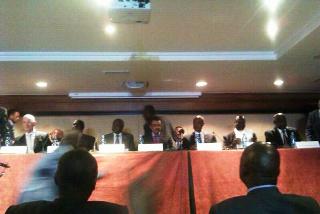UK threatens action against obstruction of peace in S. Sudan
September 17, 2014 (ADDIS ABABA) – The United Kingdom has warned South Sudan’s warring parties that those seen to be obstructing the peace process which is being mediated by the Intergovernmental Authority on Development (IGAD) will face tough action.

“A permanent ceasefire will build confidence and provide space to finalise transitional arrangements. Those in breach will be held to account for their actions,” he said.
“IGAD and the African Union have committed to apply punitive measures against those who obstruct peace. The region should now take steps to apply sanctions against those who do not abide by their commitments. The UN Security Council should also take action soon,” he added.
The warning came a day after the sixth round of the peace talks resumed on Monday in the Ethiopian northern town of Bahir Dar between president Salva Kiir’s government and the opposition faction of the Sudan Peoples’ Liberation Movement (SPLM-in-Opposition) led by the former vice-president, Riek Machar.
It also came after the South Sudanese government barred the main opposition leader, Lam Akol, from travelling outside Juba to attend the peace talks.
Duddridge called on the parties to negotiate in good faith and agree on transitional arrangements in order to avert the humanitarian crisis in the new country.
The talks adjourned on 23 September when all the stakeholders with the exception of the government rejected the protocol on transitional arrangements which IGAD attempted to impose on the two parties.
Lam Akol’s SPLM-DC rejected the document, saying it was not owned by the parties while the former political detainees described the document as “unjust.”
The opposition faction led by Machar accused IGAD of “bias” and confused in their approach.
The rebels chairman for external relations, Dhieu Mathok Diing, said IGAD was weak to bring the government to the agreed mechanisms for the talks. He also accused IGAD of “fighting, mediating and negotiating” in the South Sudanese crisis.
“Unfortunately, when the Mediators formed thematic groups to narrow the gap, the government delegation immediately boycotted the meetings and stayed away for a week before the IGAD Summit on 25 August 2014. The mediation never issued a release explaining circumstances which led to the government move nor issued a release condemning the government attitude or even asking the government delegation to resume peace talks,” said Diing in his article published by Sudan Tribune.
“In a meeting attended by media houses, the prime minister of Ethiopia, the chair of the IGAD, stated that the warring parties will not sign the document because they requested time to discuss it, and the IGAD leaders will sign it as their position. The document was passed around for signatures. General Lazarus Sumbeywo took the last page of the document that bears names of the signatories to Salva Kiir and without asking about the text, he signed it. The paper was passed to Dr Machar, but he asked General Sumbeywo about the document being signed, he went back and came after few seconds and said ‘sorry you and Salva were not supposed to sign’ and Dr Riek replied, but Salva had already signed; but Sumbeywo said ‘I will cut Salva’s name and your name out of the document,’” he further explained.
However, the government denied responsibility for the shortcomings and blamed the rebel group for not signing the IGAD protocol.
RPD BLAMES KIIR GOVERNMENT
The Rally for Peace and Democracy (RPD), a South Sudanese organisation, also released a statement, saying it was “gravely perturbed in learning that the Government of the Republic of South Sudan is adamantly continuing to dishonour the principles of the ongoing peace negotiations as set out in the 9 May 2014 document, signed by the two sides to the raging conflict in South Sudan”.
It cited the barring of Lam Akol, leader of the main opposition party in South Sudan, the Sudan Peoples’ Liberation Movement for Democratic Change (SPLM-DC), as a clandestine decision by the government.
“The entire delegation of ‘other political parties’, including their leader Dr Lam Akol Ajawin, were denied boarding the plane to Addis Ababa at the Juba International Airport on Saturday 13 September 2014,” partly reads the statement by RPD.
“We have observed with grave concern the tactics being employed by the government agents to threaten, harass and intimidate participants coming from Juba who express different views from those of the government,” it adds.
On Tuesday, the two parties and other stakeholders began to discuss what would become of the agenda for this round of talks.
Both the government and the rebel group want to directly negotiate and would only consult the other stakeholders in making final decisions as well as brief them and allow them to attend plenary sessions.
IGAD mediators have given the warring parties 45 days since 23 September to iron out their differences and reach an agreement to end the nine-month-long crisis in the country.
(ST)
